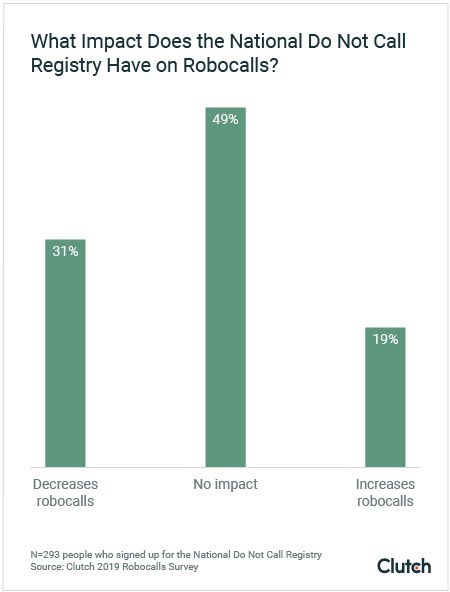More than two-thirds say National Do Not Call Registry ineffective
Traditional screening tactics aren’t working against the robocall invasion
Progress in the fight to block robocalls has been slow or non-existent, a new survey finds.
Approximately half of consumers who signed up for the National Do Not Call Registry (49%) say they receive the same number of robocalls, and 19% say they receive more robocalls since signing up. The findings come from a recent survey by Clutch, the leading B2B research, ratings, and reviews firm.

More than 80% of people surveyed actively protect themselves from robocalls, mostly by blocking phone numbers (60%).
The rest either sign up for the National Do Not Call Registry (43%) or implement a robocall screening tool (17%). The Registry, however, is ineffective because voice over internet protocol (VoIP) makes robocallers agile and hard to track.
The survey shows that robocalls erode consumer trust in phone-based communication, and that mistrust impacts their contact with peers and businesses.
Most People Don’t Answer Calls From Unfamiliar Numbers
More than two-thirds of people surveyed (67%) are unlikely to answer phone calls from unknown numbers. Experts cite robocalls as one reason people don’t trust phone-based communication.
“Bad actors create this atmosphere where the billions of robocalls made each year interrupt legitimate contact between companies and customers,” said Rick Dionisio, senior vice president of operations for RingBoost, a custom phone number retailer. “People are rightfully hesitant to answer the phone.”
Businesses should emphasize quality customer service and use personalized outreach tactics to address consumers’ hesitation to answer the phone, the survey suggests.
Screening Tools Combat Robocalls
Consumers who already use robocall screening services typically activate them through their mobile provider (23%) or third-party services such as RoboKiller (20%) and YouMail (19%).
“You run anti-virus software on your computer to protect yourself,” said Alex Quilici, CEO of YouMail. “You run these apps on your phone to protect yourself from the robocalls. It’s just another form of protection you should have on your device.”
New Legislation Challenges Robocalls
New legislation will implement system-wide changes across all telephone service providers. The combined STIR/SHAKEN standards seek to validate phone calls by checking for the presence of certificates that are distributed by a trusted authority.
The technology is a combination of the “Secure Telephone Identity Revisited” (STIR) standard and the “Signature-based Handling of Asserted information using toKENs” (SHAKEN) standard.
The Federal Communications Commission (FCC) plans to implement STIR/SHAKEN across telephone service providers in 2019.
Content created by Conservative Daily News is available for re-publication without charge under the Creative Commons license. Visit our syndication page for details.




